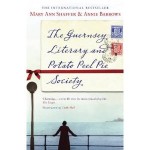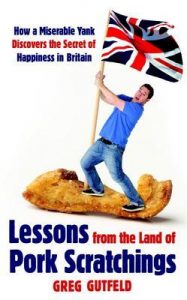Really, where does the time go? Recent (well, since may…) reads in no particular order (and probably missing a few):
The series that will no longer be named. All in a row. Lovely. I am still pretty happy with the ending, but noticed a few minor inconsistencies along the way this time.
Lessons from the Land of Pork Scratchings by Greg Gutfeld. Abysmal. Didn’t finish it. I’ll be writing more about it at some point, because, really! But, you know, take this as a warning to stay WELL away.
Packaging Girlhood. Quite illuminating. Meant to write more on this, too. Ah well.
Consumer Kids. Followed naturally. Very informative on how kids are not only inundated with ads, but used to advertise to friends and provide market research, quite frequently unknowingly. Should probably be read by every parent.
Tea Time for the Traditionally Built by Alexander McCall Smith. Perfection, as usual.
This Charming Man by Marian Keyes. Keyes back on great form and with a serious theme this time, which she excels at treating.
The Brontes Went to Woolworth by Rachel Ferguson. Reread because I had to take it down to copy out one of my favourite quotes ever:
A woman at one of mother’s parties once said to me, «Do you like reading?» which smote us all to silence, for how could one tell her that books are like having a bath or sleeping, or eating bread – absolute necessities which one never thinks of in terms of appreciation.
Paths of Glory by Jeffrey Archer. As usual Archer spins a pretty – and gripping – tale. However, knowing how it all ends spoiled it a bit for me. Not that I know all that much about Mount Everest climbs and such, but I do know a little, and the prologue reveals what I didn’t. I suppose part of it is knowing it doesn’t end in «they lived happily ever after», which I’m a sucker for and which Archer frequently delivers with aplomb. Still, exceedingly readable.
And that made me realise I’ve forgotten to note reading A Prisoner of Birth, also by Archer, which was REALLY good, just what the doctor ordered, and Archer – to me – at his best. I happen to love courtroom dramas, too, so this had pretty much everything. No idea when I read it, though, so I popped it in here… Probably shortly after the paperback was issued, but I’m not sure.
 I could have sworn I had blogged this already, but I must have dreamt it.
I could have sworn I had blogged this already, but I must have dreamt it. I bought Lessons from the Land of Pork Scratchings by Greg Gutfeld in London in July, partly because, well «A Miserable Yank Finds Happiness in the UK» appealed to me as an anglophile, partly because I like books about Britain, and partly because it says
I bought Lessons from the Land of Pork Scratchings by Greg Gutfeld in London in July, partly because, well «A Miserable Yank Finds Happiness in the UK» appealed to me as an anglophile, partly because I like books about Britain, and partly because it says